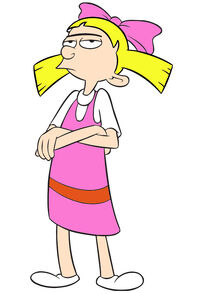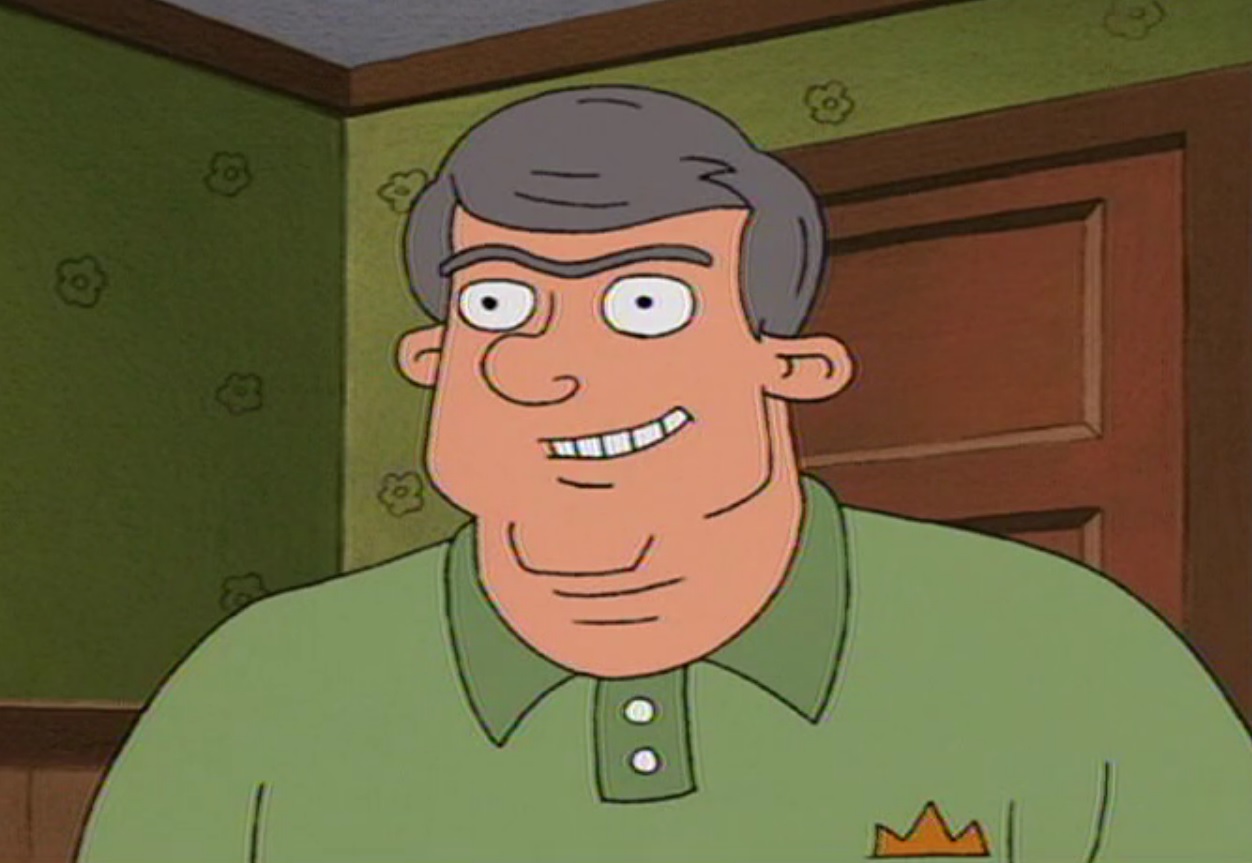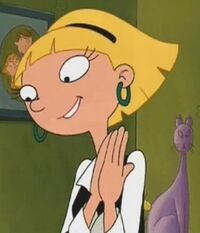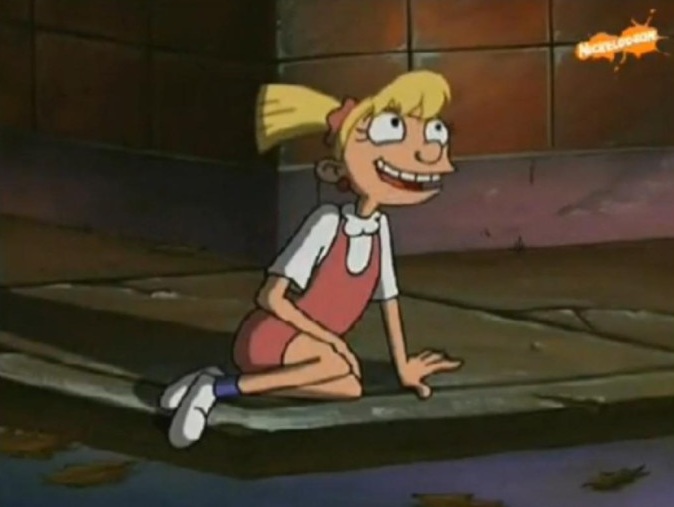The show ran from 1996 to 2004, but was never ended properly. Nevertheless I've been watching it a lot lately, as a bit of nostalgia to reconnect with my childhood. There are generally two major characters in the show: the title character Arnold, and Helga Geraldine Pataki.
Aside from Arnold, Helga receives the most attention in the series, and in fact many of the episodes focusing on Arnold often focus on her too. Sometimes the show could very well be called Hey Helga! and nothing fundamental would change. She is certainly the most interesting and multi-dimensional character on the show. One of the reasons for this is that, as a friend of mine put it: Helga is the perfect feminist.
Helga may sometimes be seen as the antagonist of the show. She's a bully, hits people, is extremely bossy and abrasive, and routinely harasses Arnold in particular. The reason for the latter of course is that she's secretly madly in love with Arnold but is afraid to tell him, and equally afraid of anyone finding out her secret. By constantly bullying him, she hopes to hide that secret.
Helga's demeanor is one of an extreme tomboy, as might be surmised from the above description of her persona. She takes after her blowhard father in both looks and personality. She has been described as "your ugly little friend with the one eyebrow" by Arnold's Grandpa Phil in the episode entitled Grudge Match (Season 4). Even boys are afraid to fight or anger her. Her pink dress and bow act as a sort of ironic costume - her clothing is traditionally feminine, but she is not.
Despite the fact that Helga is essentially the boss of the fourth grade, with the other kids routinely bending to her will, she is far from happy. As we see in the episode Helga on the Chouch (a fan favorite also taking place in Season 4) there are good reasons for her to feel this way. She is the product of an extremely dysfunctional family. Her father, Robert "Big Bob" Pataki is a successful business owner, selling beepers at his store called "Big Bob's Beepers." However, he is extremely self-centered and focuses solely on the things that please him: namely his work and Helga's older sister, Olga.
Helga's mother Miriam is a depressed alcoholic that also routinely neglects her daughter. Miriam is implied to have had much more potential in the episodes Olga Gets Engaged (Season 3), where she mentions that she was an Olympic class swimmer, and The Beeper Queen (Season 4), where she was shown running Big Bob's Beepers better than her husband does, but her marriage has generally made her a shell of a woman.
The Patakis are somewhat interesting in the sense that Miriam can be seen as the perfect feminist victim - a talented woman that gets trapped in a marriage with a successful, but blowhard of a man. However, while she wastes away, Helga to me seems the image of a real feminist: an ugly, angry, broken, bitter woman who lashes out at others to combat her insecurities. On the surface she appears to be what her mother is not (and what feminists say women need to be): assertive, dominant, and in control. Helga is a "strong and empowered woman" or technically, girl. Yet she is just as unhappy as her mother. She is jealous, defensive, and prone to lashing out, particularly at those who make her feel the most insecure: namely, her older sister, Olga.
The relationship between Helga and her sister Olga is one of my favorite aspects of the show. To the casual observer, the two sisters could not be any more different. Helga is deeply jealous of Olga because Olga appears to be everything that Helga is not: beautiful, popular, talented, accomplished, feminine, sweet, and kind. Above all: she receives all of her parent's affection, while Helga is neglected. (Olga does suffer just as much as Helga does, but that's a different topic.)
Olga routinely makes the effort to show kindness and affection toward Helga (essentially trying to give her what her parents rarely do), but Helga tries to sabotage Olga several times throughout the series. Most famously, in Olga Comes Home (Season 1), Helga changed Olga's grade from an A to a B+. This causes a severe breakdown in Olga because she hasn't received a B since the third grade. Helga grins throughout the ordeal, enjoying the fact that she's knocked Olga off her pedestal, but Arnold's entreaties eventually bring her around to changing her mind and admitting that she changed the grade. Similarly in Olga Gets Engaged, Helga tried to go along with letting Olga get married to her con-artist boyfriend, but eventually broke up the wedding when Olga declared that Helga was the best sister she could ask for. All other attempts she makes to sabotage Olga (in Student Teacher (Season 3) and Big Sis) (Season 5) fail, and so she needs to communicate her feelings to her sister in a mature manner.
Rather unwittingly or not, Helga here demonstrates another common trait amongst feminists (and social justice warriors in general): trying to sabotage and bring down beautiful women (or what is beautiful), so they can be made equal with the ugly narcissist, even when the targets of their insecurities are not responsible for any harm. Helga does have potential to be more like her sister (more on that to come), but simply does not make the effort. The result is continued unhappiness.
Despite her social dominance, Helga's personality routinely conflicts with another facet of her nature - one that is kind, sophisticated, and even feminine. Unknown to all but the audience, Helga has a much softer, more affectionate side. She writes poetry (on a good enough level to win contests with) and is the most intelligent student in her class (in the Aptitude Test (Season 3), it is revealed that she received the highest score since her sister Olga took the test, revealing that she is generally just as intelligent as her sister is and that Helga can do whatever she wants in life). These two facets of Helga's personality: the boorish exterior and the soft, sweet interior, conflict with one another throughout the series.
In the episode Helga's Makeover (Season 1), Rhonda Wellington Lloyd, a wealthy girl who is the school's self-proclaimed fashionista, is holding the first of many parties she has at her house throughout the series. It is a girls' party, and all of the girls in her class are invited, except for Helga, who Rhonda considers not sufficiently girlish enough to properly attend.
Later, Helga meets the boys in the class, who are playing baseball. Since Rhonda is having a girl-only party, they explain, they are having a boy-only game. They quickly tease her with a chant of "Helga's not a girl!" Helga responds as she usually does: with aggression. She chases Harold and threatens to beat him up. Watching the chase, even Arnold, far and away the most sympathetic and understanding character on the show, stresses that he is not truly sorry for her.
Helga receives much the same treatment when she spies on the goings-on at Rhonda's house. She finds that Rhonda is imitating her blowhard demeanor, and all of the girls, even her best friend Phoebe, are laughing. When Helga says that she "ought to deck e'm all!" outside, she finds that she is behaving in the exact same way that Rhonda and the others are currently mocking.
It is in this episode that Helga betrays an inner desire to be and act more feminine, and also a quip that gives an insight into her more sophisticated nature. When she finds Phoebe laughing at her she responds "e'tu, Phobebe?" This line of course mirrors Shakespeare's in Julius Caesar, when Caesar is aghast that Brutus has betrayed him. This is something that a nine-year-old shouldn't be smart or sophisticated enough to say, but nonetheless Helga does.
Helga does look more feminine in this episode, but she overdoes it, becoming a caricature to the viewer (if not to Rhonda and the others themselves).
The same friend of mine says that Hey Arnold! is rife with Cultural Marxism, and looking at this episode it would be hard to disbelieve him. It is a not-so-subtle assault (to the trained senses) on that favorite feminist boogeyman: the gender binary.
But if Cultural Marxism is present in Hey Arnold!, the show also shows the inner unhappiness of those who espouse it, with Helga being the best example.
Back to Helga, then. Helga has an inner desire to be feminine (one which she openly admits) in Helga's Masquerade (Season 5), wherein she is offered pointers by Lila, a pretty, popular, and refined girl who is well-liked by boys (including Arnold, much to Helga's chagrin), but she never follows through with it, whether that be in Helga's Masquerade or elsewhere. She always reverts to her same self, never truly improving or even desiring to improve, a trait commonly seen in feminists and other social justice warriors.
This is painfully ironic because, whenever Helga acts the least bit feminine and sophisticated (except for in Helga's Makeover where she was posing and not being genuine), she is successful in achieving her grandest desire: Arnold's attention and affections. However, this never happens directly. It is an allegory for Helga's masked potential that she does not let come out throughout the series.
We see this in Helga's Masquerade, where Helga dresses and acts like Lila, receiving Arnold's affection. It is also present in Arnold's Valentine (Season 1), where she poses as Arnold's French pen pal, Cecile. The closest this aspect of Helga comes to being reality is in Arnold Visits Arnie (Season 5), wherein Arnold dreams he visits his weird cousin Arnie and all that he knows is turned on its head. The result is that Helga has become Hilda, a kind, feminine, sophisticated girl that recites poetry. This is in fact the hidden side of Helga's personality that Arnold does not get to see, and he is immediately attracted to it. It is just another example of what could have been...if Helga made the effort.
Ultimately I find the character of Helga Pataki to be a cautionary one. She comes from a broken background, but many a true champion in life has as well. We cannot control the circumstances of our birth, nor the actions of others if they are unwilling to change. How you decide to deal with your situation is ultimately your choice.
Law 25 of Power: Recreate Yourself.
The character you seem to have been born with is not necessarily who you are. Beyond the characteristics you have inherited, your parents and peers have helped shape your personality. The Promethean task of the powerful is to take control of this process, to stop allowing others to limit and mold them. Remake yourself into a character of power. Working on yourself like clay should be one of your greatest and most pleasurable life tasks. It makes you in essence an artist creating yourself.
This is a quote that I find perfectly applies to Helga, or rather, what she should be doing. The potential is easily there. It is up to her to take control of herself, which she does, but not in the way that produces the outcome that she wants. The most visceral quote that describes Helga best would have to have come from Inge in Helga and the Nanny (Season 3):
You're such an angry girl Helga, and you won't let anyone help you. So you must live with your unhappiness.
Helga does this with nearly anyone that tries to help and be affectionate to her: examples being Inge, Olga, and Arnold, and thus wallows in a deeply-entrenched misery throughout most of the series (the only exception was Dr. Bliss in Helga on the Couch, and this was essentially forced). She has friends, but isn't truly happy with herself, and for the most part, refuses to change. She fits the profile of most feminists. The only thing she doesn't do is play the victim card (which is admirable). If Hey Arnold! is rife with Cultural Marxism, it also shows the ugliness behind the philosophy within it.
The lesson is clear: Law 25 prevails. Do not be a Cultural Marxist. It is poison to the self.
This blog post contains affiliate links.



.jpg/200px-(Miriam).jpg)


Feminists today are fat, angry and they hate men. News That's Fat and Fair
ReplyDeleteYou're fat :P
DeleteInteresting post, but parts of your argument are very hollow, such as the character of Hilda. I wouldn't necessarily say she's more feminine than Helga, the only obvious thing being her long lashes. She's poetic and kind, which aren't just feminine characteristics and definitely NOT something feminists resent.
ReplyDeleteI know what you are aiming for, but the kind of "feminism" you talk about isn't representative of what it truly means.
Today, I was just browsing along and came upon your blog. Just wanted to say good blog and this article helped me a lot, due to which I have found exactly I was looking. cosplay Deutschland
ReplyDelete